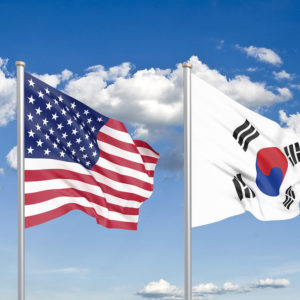This nightmare scenario comes to mind: The Chinese have invaded South Korea in the name of the North Koreans, who are sort of an auxiliary force, and the wobbly, weak-kneed American president decides the South Koreans can fight on their own with no American troops, no U.S. air or naval power, just the arms the Americans have been selling them for multi-billions.
The Americans, those who are left in the South, have all fallen back to Camp Humphreys, the sprawling base south of Seoul, and nearby Osan Air Base. The South Koreans have fought valiantly, but the Chinese hordes have overwhelmed them and now are surrounding an enclave from Humphreys to Osan.
The Americans have built up the walls surrounding Humphreys into what the U.S. commander assures journalists is an impenetrable fortress. Then the Chinese begin firing missiles into the base. The American president, having been elected on the populist slogan, “War is Wrong,” decides it’s time to get out. His secretary of state negotiates a ceasefire with the Chinese for the 10 days he guesses it will take to airlift all U.S. troops and contractors and families and Korean staff out of Humphreys and Osan. The U.S. flag comes down, and the American era in South Korea, the Republic of Korea, is history.
No, nothing like that is going to happen in the foreseeable future, but we have to consider beyond the horizon, an apparition that’s vague, hazy, like a bad dream that’s hardly remembered in the bright light of day. The American debacle in Afghanistan confronts us with a future that’s uncharted and unknowable. President Joe Biden pulled out the cork arbitrarily, failing to consult with allies from Japan to Great Britain.
The Brits in particular didn’t think it was time to rush pell-mell out of Afghanistan. They had their own troops there. They knew the chaos that would ensue if the befuddled U.S. president, who talks from several sides of his mouth simultaneously, if not comprehendingly, had remembered to call his friend Prime Minister Boris Johnson and let him in on the plan.
Now it’s foolhardy to predict the future — anything can happen. It’s a little misleading to say, North Korea is too weak to do anything while Kim Jong-un worries about his failing economy and the pandemic that he denies has sickened his people. Nor is it safe to assume the Chinese, luxuriating in their enormous trade surplus with the U.S., are smart enough not to kill the golden calf.
Think how the Chinese will feel after the U.S challenges them in the South China Sea, the Indian Ocean, and a dozen other pressure points. Some day they may decide it’s time to recover Taiwan, the independent island state that Beijing claims as its own, and while they’re at it reunite the Korean peninsula in the name of their subservient vassal in Pyongyang.
It’s disingenuous to say, well, look, North Korea under Kim Jong-un’s granddaddy Kim Il-sung didn’t do a thing after the defeat in 1975 of the U.S.-backed government in Saigon. Would that not have been the perfect time to send the troops down again, just 25 years after they invaded the south at the outset of the Korean War? No, it obviously was not.
China, immersed in inner turmoil, overrun by Red Guards during Mao Zedong’s Great Cultural Revolution, was not about to go to war again for Korea. After Mao died in 1976, China slid under the rule of Deng Xiaoping, the reformer who opened up the country to modern capitalism while maintaining Communist rule – not easy to do while fending off Mao’s widow and the “Gang of Four.”
Times have changed remarkably since the Americans were living through the fall of Saigon, flying out Americans and Vietnamese who had worked for them, leaving hundreds of thousands to get out by sea on voyages in which many drowned. Since those terrible days, China has become a powerful nation and North Korea has gone nuclear. The North by now has fabricated a few dozen warheads and the missiles to send them to distant targets, not to mention mid-and-short-range missiles within easy range of anywhere in South Korea and most of Japan.
Neither China nor North Korea, which can’t do a thing without China’s say-so, has South Korea in its sights at the moment. The mess the Americans created in Afghanistan, however, exposes American weakness as harshly as did defeat in the Vietnam War. In Beijing and Pyongyang, leaders and strategists have to be plotting when might be the time to strike.
They can afford to be patient while the nitwits in the White House and Pentagon scratch their heads and pray they’ll never have to fight for anyone, including their Korean ally.

